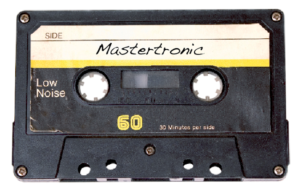It’s hard to believe with today’s insane prices, but videogames could be bought for as cheaply as £1.99 back in the Eighties. These budget games became extremely popular, with companies such as Codemasters starting off this way. One of the most popular however was Mastertronic, which had a host of games that covered all sorts of different genres. Here we talk to the people who helped found this company, which is still going strong today.

The truth is, if it were 1983, you’d probably go home empty handed. Why? Because, believe it or not, this was an era when budget software hardly existed. The cheapest game you could purchase was generally a minimum of five pounds, with prices reaching an eye-watering ten quid. Fortunately, a small band of entrepreneurs – fresh from the buoyant video industry – formed a partnership in this year that would ease the pain of those school kids on a tight budget – which, let’s face it, was most of us.
Their names were Martin Alper, Frank Herman, Terry Medway and Alan Sharam, four men with virtually no experience of the game software market, but outstanding knowledge and contacts in the fields of marketing and distribution – and they had a plan. The men had joined forces, following a meeting convened by Martin and Frank, in order to generate interest in a new company specialising in games distribution. Its first home, the basement of Alan’s existing business (a surveying and property company) on George Street in London, would become the spiritual beginning of this low-price revolution.
The Magic Knight games were extremely popular for Mastertronic.
But back to the plan, which would contain two vital tenets. Firstly, and most importantly, was the price. The men wanted their games to enter the market at an unprecedented level, a level previously thought of as unsustainable by other software houses of the time, with the theory being that the low cost alone would sell the game. Secondly, they wanted to widen the availability of their games, to sell them at retail locations hitherto alien to computer software. To achieve this, the entrepreneurs turned to someone they already knew from the videocassette business: ex-professional cricketer, Richard Bielby.
“Frank [Herman] had the rights to sell a particular range of American films and I contacted him in 1982 with a view to selling them into my outlets,” begins Richard. “The business expanded quickly, and I began taking on self-employed agents to sell on my behalf throughout the UK.” Richard would meet with the avuncular Frank Herman each week to settle his account and collect more stock. The location was often a video shop owned by Martin Alper and Terry Medway, also in George Street, London.
“Towards the end of 1983, Frank asked me if I would also be interested in offering a new proposed range of computer games,” says Richard, “and it was suggested they would be a nice extra line to sell during the quieter summer months.” And so, a gentleman’s agreement between Richard Bielby and Mastertronic was formed, whereby Richard (with assistance from his wife, Alison) supplied all independent retail outlets. The range was launched on 01 April 1984. “We found that by the end of that first week we had sold in excess of 40,000 games,” grins Richard, “and these were sold into garages, newsagents, video and convenience stores.” With Mastertronic using self-contained 100-game dealer packs (complete with a counter stand), such outlets lapped up the new product. Conversely, because of the low retail price, the computer game wholesale industry had little or no interest in the games. Richard Bielby’s sales operation and Mastertronic was the perfect match. “We didn’t really need a clever strategy because the games sold themselves,” he notes, “so I saw my role as finding good agents who could offer a first-class and efficient service.”
Chiller was by the Darling brothers. They soon realised they’d have more success on their own, forming Codemasters in the process.
Naturally, Mastertronic still needed developers to write its games, and so had already begun forging alliances with programmers. The first of these was Galactic Software – aka Jim Darling and his two sons, Richard and David – and the siblings were swiftly producing some of Mastertronic’s most popular early games. “They were undoubtedly vital – as young kids they were brilliant at turning out very playable games to their peer group in no time,” says Richard, “and new titles were the key in those early days.” More development partners such as Binary Design and Mr. Chip were also recruited. For these and other solo efforts, Mastertronic’s games buyer was John Maxwell, who would contact any prospective young coder in order to propose a deal. Such deals varied, but generally Maxwell would offer an up-front fee followed by royalties per unit sold, usually five or ten pence.
Working with the Darlings was 18-year old Alison Beasley, who also moved across to the budget publisher in 1984 as the young coders became part of the Mastertronic operation, performing in the role of evaluating new submissions. Alison herself would soon also have a vital part to play, as she explains: “When I first joined I did a bit of anything – reception, paperwork, taking orders and more – but it wasn’t long before I suggested they do a newsletter for their customers and they let me have a go.” The newsletter was a success and prompted Alison to ask Mastertronic’s founders if she could try her hand at public relations as well. “They were very supportive and encouraging – in the way that true entrepreneurs are.” Alison’s role expanded with encouragement from Martin Alper – she soon became involved in marketing, artwork and presentations, including trips to computer game fairs and forming a bond with the ever-growing batch of game magazines. This latter task would test her new skills considering Mastertronic’s advertising budget: “They didn’t believe it was a good way to spend their money – and I think they were right,” ponders Alison, “as efforts went instead into getting the best product they could and supporting the retailers with the racking systems and blister packs.” As to the magazines themselves, with Alison in regular contact and promoting the latest games, Mastertronic would eventually build a good relationship with the press. “Although it was often about them not reviewing a game – if I thought it was a stinker – than about actually reviewing it!” she laughs.
Mastertronic’s success was done to covering all types of games and genres. This is the rather enjoyable Space Walk.
We have formed a picture of the operation of Mastertronic, but what of its enigmatic founders? Frank Herman still involved himself with many facets of the business while Alan Sharam concentrated on sales and distribution. Terry Medway, as co-owner with Martin Alper of the original video shop on the street where Mastertronic ostensibly began, sold his share of the company early on, while Martin himself jetted across the Atlantic in 1986 to set up Mastertronic in the United States. Joining in 1985 was Anthony Guter, a much-needed recruit for the accounts department, and a year later Ron Harris, head-hunted by Frank Herman from Argus Press Software to facilitate the continual supply of games. Ron joined the company as it was entering its most successful period, and essentially filled the hole left vacant by the departing Darlings, who had decided to create their own software house. “The atmosphere was very much one of aggressive growth,” he recalls, “and it was a vibrant and expanding company. Yet formal systems came very much second to getting it done.” This was demonstrated palpably to Ron when it came to his first task at Mastertronic: organising the office partitioning for his new development department. “I had asked for an office and was told, if I wanted one, to go and build it,” he smiles, “and when it was finished, Frank wandered in, looked around, said ‘I’d have built it bigger’ and left…” Ron and his team proved crucial to Mastertronic, sifting through ‘letterbox’ submissions for suitable games, then hunting out bugs and building master tapes, often as many as 20 a week.
By 1987, the games market was changing rapidly. Full-price 8-bit software was dying, replaced by a booming budget industry that was also destined to be short-term. After several years of practically owning the low-price games market, Mastertronic suddenly found extreme competition thanks to rivals Codemasters, Firebird, Players and Alternative – in addition to full-price publishers such as Ocean and Elite concocting their own budget labels to re-release back-catalogue games. Mastertronic began doing the same, re-releasing classic titles on its Ricochet label, initially with games owned by Melbourne House (which it had recently purchased) and then other third-party titles, including a phenomenally successful re-release of Activision’s excellent Ghostbusters. Things were looking up for Mastertronic, especially when Frank Herman realised that Sega lacked a suitable UK distributor…
Notable Mastrtronic Games
Voyage Into The Unknown




To read the whole feature you can download issue 118 from GreatDigitalMags.com
Retro Gamer magazine and bookazines are available in print from ImagineShop






![Kaboomania – A bomberman clone is coming to the Amiga and PC, Kickstarter soon! [DEMO UPDATE] Kaboomania – A bomberman clone is coming to the Amiga and PC, Kickstarter soon! [DEMO UPDATE]](https://gamingnewsmag.com/wp-content/uploads/2026/02/bommm-390x220.jpg)


